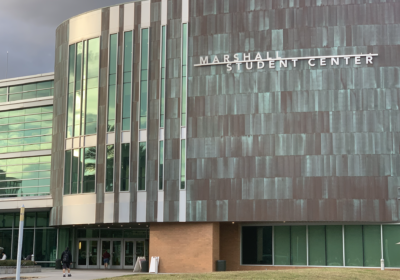Activist lectures on MLK legacy
Remembering Martin Luther King Jr.’s legacy “the right way,” was the focus of a University Lecture Series (ULS) lecture given by contemporary social activist and Columbia University associate professor Marc Lamont Hill.
“Very often we hear about Martin Luther King and we think of Martin Luther King and wecelebrate Martin Luther King and we remember Martin Luther King, but we do it in a certain kind of way that doesn’t always yield a deep enough analysis orunderstanding of who and what he was and who and what he stood for,” Hill said Thursday before 150 people in the Marshall Student Center Ballroom.
Hill, who has worked as apolitical contributor for Fox News, CNN and MSNBC, said to best remember King’s legacyand follow in the civil rights activist’s footsteps one must listen carefully to others. When King lived in Chicago heregularly met with activists,sanitation workers and anti-war protesters.
“He listened,” Hill said. “He listened to people with different politics, different agendas, different projects (and) different sources of ethnic origin. He listened to all that stuff because he understood.”
Hill said society must begin to ask different questions, as King did in his “I Have a Dream” speech. The famous speech was not about a dream, Hill said, but rather a promise that should one day be fulfilled.
“He referred to the Constitution and the Declaration of Independence as a promissorynote – America, you promised,”he said. “Emancipation Proclamation, Declaration of Independence – America, you promised. Thirteenth,14th, 15th amendments – America,you promised, 1954Brown v. Board of Education, 1965 Voting Rights Act – America, you promised.”
While King might be best remembered forhelping advance the rights of black Americans, he said King also worked to unitepersons of different ages as well.
“The listening that we have to do is not only with peoplewho look different, who come from all different genders and races, but also from people who come from differentgenerations,” Hill said. “We have to see the value in young people. Dr. King was 39 when he died he was a young man.”
Hill said he believes that such changes begin with younger generations. Allgenerations deserve to see an America that is “as good as itspromises,” he said, but “there was never a revolution led by oldpeople.”
“The point is not to figure out how we can duck, dodge and deny death, but the point is to figure out how to live a life that is more full, that is more loving,” Hill said. “That is more selfless. That is the legacy of King.”
As the ULS event shifted from a lecture format to aquestion-and-answer sessionwith Hill, a Tampa spoken-wordpoet who goes by the name LIFE, asked Hill about police violence against African-Americans.
“The African communities of Tampa are heavily occupiedby police, like Africancommunities across the
country,” LIFE said. “In 2010, you had an encounter and made a great stance against the Philadelphia Police Department. … Would you offer some advice to those of us who have faced those same … experiences? So many of us experience that same thing and do nothing about it.”
According to the Philadelphia Inquirer, in June 2010, Hill alleged that after dropping a friend off at his house, a Philadelphia police officer forcibly searched Hill and his vehicle without a warrant.In October 2010, Hill filed a
lawsuit against the Philadelphia Police Department.
“He didn’t give me a ticket or anything, and his partner said, ‘Do you know why I pulled you over?’ and he said, ‘Illegal discharge of a passenger,'” Hill said Friday. “All I was trying to do was let someone out (of the car). So after I was done, I tweeted about it … and people asked what I was going to do.”
Hill said it wasn’t the first time police treated him unfairly,but it was the first time it had happened since he developed a public presence.
“I said, ‘I have a responsibilityto say something,'” Hill said of his experience. “We all have a responsibility to say something, but they might listen to me – I put my white-T on a littledifferently – (more) thansomebody else because I have a name and the resources.”






